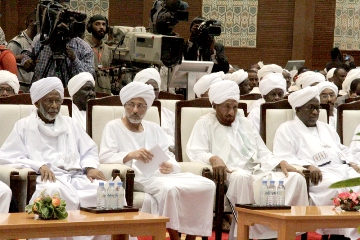Two more opposition parties suspend participation in Sudan dialogue process
January 20, 2014 (KHARTOUM) – Two more Sudanese opposition parties have decided to suspend their participation in national dialogue, as the Popular Congress Party (PCP) of Hassan al-Turbi reiterated its commitment to the internal political process.

In a statement released on Tuesday, the Reform Now Movement (RNM) of Ghazi Salah Eddin al-Attabani and the Just Peace Forum (JPF) led al-Tayeb Mustafa announced they had decided to boycott a meeting between president Omer Hassan al-Bashir with the dialogue committee on Wednesday, saying that some parties are invited to participate as opposition representatives while they are not.
They further decided to “suspend participation in the national dialogue until the requirements of a conducive environment (…) are met”.
The two opposition parties identified 12 confidence building measures saying that it was agreed in the roadmap of the national dialogue and endorsed by the regional and international organisations supporting the process.
These measures include the release of political detainees, freedom of expression, freedom of movement and travel, end media restrictions, take the needed measures to allow the return of opponents and rebels into the country, stop war and allow humanitarian access.
The two parties also rejected the “secret and unilateral” constitutional amendments increasing the powers of the Sudanese president, and reiterated their objection to the general elections scheduled for next April.
TURABI OFFERS UNRESTRICTED SUPPORT
Like the PCP, the RNM and JPF are splinter factions of the National Congress Party led by Bashir. However. since the start of the national dialogue process, the party of Hassan al-Turabi shows more willingness to make concessions to the ruling party.
The PCP reacted quickly to the decision of the two parties and reiterated its commitment to the internal political process. It also confirmed its participation in the meeting with president Bashir.
PCP political secretary Kamal Omer Abdelsalam said the statement was “misleading” because it did explicitly say that the decision of suspension concerns only two parties.
He questioned statements to Sudan Tribune, asking “why did the RNM and JPF not clearly name the parties that suspended their participation in the process?” adding that his party, Justice Party, NUP, Federal Truth Party (FTP) and the East Front parties are still part of the process.
He added that the requirements of a conducive environment which are already in the roadmap will be discussed on Wednesday’s meeting with the president.
Abdelsalam disclosed that they were surprised by the suspension, adding “these forces know that the process is fraught with violations”.
Analysts in Khartoum say the real dialogue in Sudan is between the NCP and the PCP, alluding to the unconditional support of Tuarbi party to every political move taken by the ruling party.
They add that for the PCP the priority at this stage should be maintaining the Islamic regime in Sudan at all costs.
Last year, Abdelsalam criticised the opposition parties for their support to the then defence minister Abdel Fattah al-Sisi when he toppled the regime of the Islamist president Mohamed Morsi in July 2013.
He said the Sudanese opposition supported the overthrow of a constitutional government in Egypt by the army because of its Islamic orientation.
On Sunday, the rebel SPLM-N secretary-general, Yasir Arman, called on Islamic forces in Sudan to sever ties with regime and to join the camp of the opposition forces in their demand for peace and democratic reforms.
(ST)
